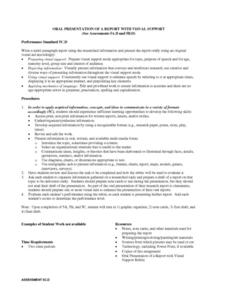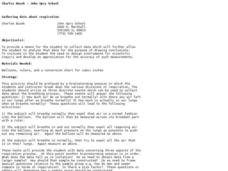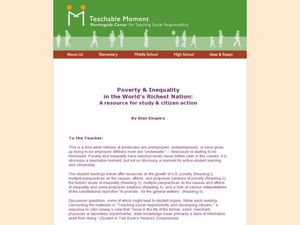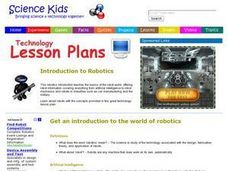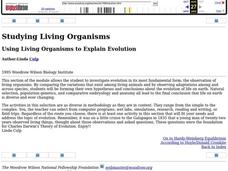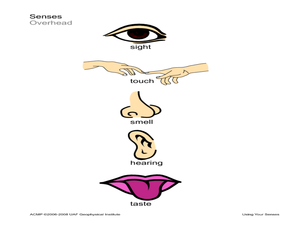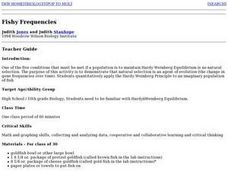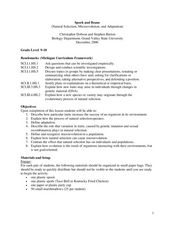Curated OER
Oral Presentation of a Report With Visual Support
Students create multi-paragraph report using the researched information. Over several class periods, students research a topic of their choosing and create a one-two page report. Student reports are presented to the class using an...
Curated OER
Supply and Demand
Students access a tutorial website entitled "Supply and Demand," and participate in interactive activities in the computer lab. They read two articles and complete a post test experience.
Curated OER
Gathering Data About Respiration
Learners engage in an experiment that tests how much air we breathe in and out during the respiration process. In this respiration lesson, students blow a typical breath's amount of air into a balloon. They use a ruler to measure the...
Curated OER
Applied Science- Physics
Students investigate how something at home uses physics to work. In this practical physics lesson plan, students develop a theory of their own to conclude how an object might work. This lesson plan includes a worksheet.
Curated OER
Chapter 10: "Currents of Change in the Northeast and the Old Northwest" Chapter 11: "Slavery and the Old South"
Students use the indicated text and the internet to compare and contrast the North and South. They discuss the social and political implications of the two predominant economic systems (slavery and factory). They are introduced to the...
Curated OER
The Mystery of the Disappearing Tracks
Fifth graders watch as the teacher projects a series of pictures on the wall showing bird tracks heading toward each other but not meeting, two tracks converging into one, and two tracks converging and then being scuffed up. They write...
Curated OER
Human Development
Young scholars are introduced to the stages of human development. In groups, they research the theories of Erickson, Maslow and Havighurst and compare them to one another. To end the lesson, they present their material to the class and...
Curated OER
Why Do Ice Cubes Melt?
First graders investigate water properties by participating in a hands on experiment. In this ice formation lesson, 1st graders examine real ice cubes in a bowl and identify the reasons why certain cubes melt faster than others. Students...
Curated OER
Reflection Experiments
Seventh graders investigate with light rays. In this light lesson, 7th graders determine the angle of reflection using simple materials. They continue the investigation by exploring the theory that light which is not reflected or...
Curated OER
Culture Clash: New World Meets Old
Sixth graders explore the history of Christopher Columbus. In this World History lesson, 6th graders research facts about Christopher Columbus. Students write their own opinion about Columbus's background focusing on three...
Curated OER
Poverty and Inequality in the World's Richest Nation
Students examine poverty and inequality in America. In this current events lesson, students read the provided articles "Poverty," "Inequality Growing in America," "Inequality: Views on Causes, Effects, Remedies," and "Theories on the...
Curated OER
Universal Myths and Symbols: Animal Creatures and Creation
Pupils examine the role of mythology in their own lives. After reading stories, they discover the various theories on the origins of the universe and compare the symbols used by different cultures. To end the lesson, they research a...
Curated OER
Introduction to Robotics
Students explore robots as it relates to artificial intelligence and mechanics. In this introduction to robotics lesson, students examine the technology related to design, research the concept of fabrication theory and the application of...
Curated OER
What a Cosmic Web We Weave
Students explore, using journals and discussion in small groups, how the universe has evolved since the theoretical Big Bang and create dramatizations of various eras in cosmic evolution.
Curated OER
How Evolution Works
High schoolers discuss the evolution of the eye and how a complex organ can evolve through natural selection. They research genetic variation, adaptation, and sexual selection. They analyze data to determine how beak length of Gal??pagos...
Curated OER
Using Living Organisms to Explain Evolution
Students investigate evolution in its most fundamental form: the observation of living organisms. By comparing variations that exist among living animals, students formulate their own hypotheses and conclusions about the evolution of...
Curated OER
Using Team Games Tournaments
Students review the unit on evolution and natural selection by playing a card game. Students take turns drawing a card from the stack and reading the question out aloud. The reader gives an answer. The other students, in turn may pass or...
Curated OER
Using Your Senses
Young scholars make observations. In this sensory skills lesson plan, students use their senses as well as tools that sharpen their senses to make observations regarding foods and other items.
Curated OER
Scavenger Hunt: A Group Collection
Students be complete a collection of living organisms and systems from the school campus.
Curated OER
PRIMATE CLASSIFICATION: Evolution, Cladograms,
Students transfer examples (names) of primates from their location in an outline hierarchy of primate groups into a set of nested boxes reflecting that same hierarchy. A cladogram can then be drawn illustrating how these groups are...
Curated OER
Mimicry: An Example of Adaptation
Students are able to explain the relationship between adaptation and ability for survival and reproduction. They are able to give examples of a series of adaptations that would support the idea that evolution is a series of minor...
Curated OER
Fishy Frequencies
Tenth graders demonstrate that natural selection is an agent of evolution. They quantitatively apply the Hardy-Weinberg Principle to an imaginary population of fish. They utilize math and graphing skills, collecting and analyzing data,...
Curated OER
Spork and Beans
Learners examine natural selection, how it works and how it can cause microevolution. In this evolution lesson students complete a lab activity that shows the effects that natural selection has on organisms.
Curated OER
Clipbirds
Students attempt to pick up various objects with a wide variety of beaks, including scissors, spoons, etc.


